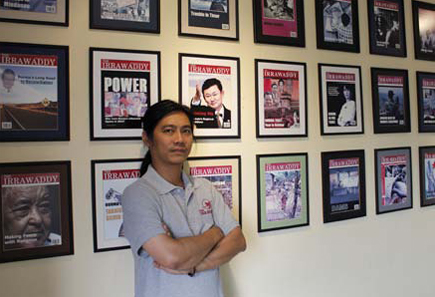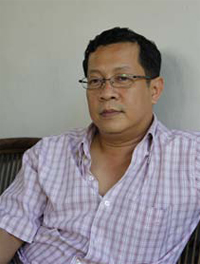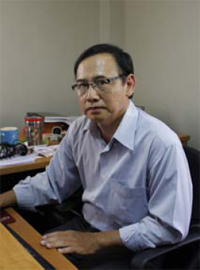Exiled journalists are still wary despite the government's promise of reform and media relaxation
The government of Burma has been surprising the world with its political and economic reforms. Many people are excited about the recent news that the government vowed to abandon its censorship board, which has long been oppressive to media. Despite some media relaxations, many exiled journalists still doubt there will be true freedom of the press and they will be able to play a watchdog role if they go back to work inside the country.
“The question is can we cover things like corruption? Are we allowed to follow and investigate those who were corrupt during the previous regime and who are at present?" asked Khin Maung Soe, editor of Democratic Voice of Burma (DVB), an Oslo-based exiled media which broadcasts daily satellite TV and radio and produces online content as well.
The case of a weekly local newspaper The Voice was sued by the Ministry of Mines highlights the point of DVB editor. The paper printed the government's report of the alleged financial transgressions among Ministry officials. As a result, the paper was prosecuted and the case is currently being heard in court.
 Every publication had to go through the Press Scrutiny and Registration Division (PSRD) of the Ministry of Information to be censored during the military government. But after 2010 general election, a quasi-civilian government led by President Thein Sein started loosening media restrictions such as allowing access to banned websites, lifting the entire censorship control on most non-political and non-religious books, and allowing journalists to form associations and unions.
Every publication had to go through the Press Scrutiny and Registration Division (PSRD) of the Ministry of Information to be censored during the military government. But after 2010 general election, a quasi-civilian government led by President Thein Sein started loosening media restrictions such as allowing access to banned websites, lifting the entire censorship control on most non-political and non-religious books, and allowing journalists to form associations and unions.
But it was ironic that some content of the speech of the president and the speech of opposition leader Aung San Suu Kyi were even censored by the state run TV and newspaper. This made some critics wonder who was more powerful: the information minister or the president?
The New York-based Committee to Protect Journalists (CPJ) listed Burma the seventh among the 10 most censored countries of the world in a report released in early May of this year. It reported that the vast censorship structure still remains in place. In March of this year, the government's PSRD banned a commentary written by journalist Ludu Sein Win on a media conference organized by Ministry of Information officials. Sein Win criticized that journalists who participated in the conference have been "helping to make the rope to hang themselves" as it would try to control the media. The commentary was published in The Irrawaddy, a Chiang Mai, Thailand based news magazine which also produces online content in Burmese and English.
Exiled media including the Irrawaddy and DVB have played a key role in the democratization of Burma by informing both the people of Burma and international community about current situations and human rights abuses by the Burmese military government for more than two decades. Most of them came to exist after the 1988 uprising when the junta oppressed and cracked down on the demonstrations forcing many people to flee to avoid imprisonment. Since then, more and more exiled media have developed in neighboring countries Thailand, India and Bangladesh aiming to bring democracy to Burma by covering news and exposing the wrong doings of government officials and big business organizations.
 “We come exile to cover news that we could not write under the censorship and it's not to do what people inside are able to do," said Khin Maung Soe, who worked as a writer and published many books before joining the exiled media in 2004.
“We come exile to cover news that we could not write under the censorship and it's not to do what people inside are able to do," said Khin Maung Soe, who worked as a writer and published many books before joining the exiled media in 2004.
The recent change of the media landscape is not convincing enough for him to decide to go back soon. "If there is still censorship, I am not going to go back even though I am not sure what my news agency would do," he said determinedly. He believes that if the government does the wrong things, media should have the right to expose them. He came outside to report those misbehaving and corruptions. "So what's the point of going back?" he said.
But Mizzima News, New Delhi-based with Chiang Mai bureaus Burmese news agency has already moved its operations to Burma to start its financial reporting as it saw the change as an opportunity. Some journalists of The Irrawaddy and DVB have been granted visas to carry out assignments inside the country. However, according to the founder and editor of The Irrawaddy Aung Zaw, who has been granted a journalist visa back to the country after more than two decades in exile, it is still difficult for them to do what they are able to do outside: remain independent, be critical and impartial and stick to the ultimate goal, which is to report the truth.
Meanwhile three main media associations, the Myanmar Journalists Association (MJA), the Myanmar Journalists Network (MJN) and the Myanmar Journalists Union (MJU), have been formed inside the country aiming to promote freedom of the press and protect journalists' rights. They have been active in organizing and participating in media conferences and consulting the Information Ministry to draft the media law and to form a Press Council, which would replace Burma's censorship board.
"We are still here. So you can say there's really no change yet."
Aung Zaw, The Irrawaddy editor
According to Information Minister Kyaw San, the Press Council would take responsibility in monitoring the media to ensure their work follows the 1962 Printers and Publishers Registration Act and the government's 12-point censorship policy. The acts implemented after military took over in the 1962 coup allow the government to imprison journalists for contravention the ideology and views of the government and for causing threat to national unity or security.
 But those three journalists organizations objected that the Press Council should be independent and working for the protection of journalists and on media ethics instead of trying to control the media.
But those three journalists organizations objected that the Press Council should be independent and working for the protection of journalists and on media ethics instead of trying to control the media.
"We cannot say that the media is free yet as the government still controls the registration of magazines and journals, publishers and distributors. In 1962 act, there are many restrictive laws which can intimidate free media and journalists," said Ronald Aung Naing, an exiled journalism trainer based in Thailand and the founder of an online news organization called News Media Network.
Aung Naing warned that the government restrictions on media are still massive. For example, Electronic Act, regulation for internet usage, is still imposed and journalists can be easily charged of using USB and importing modem without permission, he said. Aung Zaw said that he is going to study the media law, which is currently being drafted, when it comes out. He said his colleagues in big media organizations inside still have no idea what is going to be in the media law and whether it is going to guarantee the press freedom.
Aung Zaw is also afraid that he will not be able to do the same even if he relocates. "We don't intend to live here forever. We all ought to go back," he said. Aung Zaw said that he should really be happy if he can transfer his agency's capacity, human resources, and experience to set an example of independent media organization because of change and because of the door open. But that has not come yet, he said. "We are still here. So you can say there's really no change yet."
This article is contributed by Sai Aung Hsen, a student in Journalism - Editor



